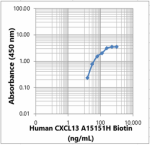- Clone
- A15151H (See other available formats)
- Regulatory Status
- RUO
- Other Names
- B cell attracting chemokine (BCA-1)
- Isotype
- Mouse IgG2a, κ
- Ave. Rating
- Submit a Review
- Product Citations
- publications

-

Direct ELISA showing purified anti-human CXCL13 (clone A15151H) bound to plate-immobilized recombinant human CXCL13 protein (Cat. Nos. 574702, 574704, 574706, and 574708). The wells were incubated with serially diluted primary antibody at room temperature for 2 hours in 1% BSAPBS, followed by incubation with HRP Goat anti-mouse IgG (Cat. No. 405306). TMB High Sensitivity Substrate Solution (Cat. No. 421501) was used for detection. Absorbance was measured at 450 nm.
| Cat # | Size | Price | Quantity Check Availability | Save | ||
|---|---|---|---|---|---|---|
| 612652 | 100 µg | 372€ | ||||
CXCL13 was initially described as a chemokine highly expressed in the follicles of Peyer's patches, spleen, and lymph nodes and as a strong chomoattractant for B cells. CXCL13 is expressed by T follicular helper cells, dendritic cells, and stromal cells in B cell areas of secondary lymphoid tissue. CXCR5, the receptor for CXCL13, was initially cloned from Burkitt’s lymphoma cells and named BLR1. CXCR5 is highly expressed in those cells and B cells. CXCL13, CCL19, and CCL21 are involved in the formation of tertiary lymphoid tissues in chronic antigeninduced arthritis. CXCL13 takes part in the allergic airway inflammatory process. In addition, high expression of CXCL13 has been linked to lupus, Helicobacter pylori-associated gastritis, multiple sclerosis, and rheumatoid arthritis. In summary, CXCL13 is highly expressed at the sites of new lymphoid tissue formation in a variety of chronic inflammatory conditions.
Product DetailsProduct Details
- Verified Reactivity
- Human
- Antibody Type
- Monoclonal
- Host Species
- Mouse
- Immunogen
- Human Recombinant CXCL13 Protein
- Formulation
- Phosphate-buffered solution, pH 7.2, containing 0.09% sodium azide
- Preparation
- The antibody was purified by affinity chromatography.
- Concentration
- 0.5 mg/mL
- Storage & Handling
- The antibody solution should be stored undiluted between 2°C and 8°C.
- Application
-
Direct ELISA - Quality tested
- Recommended Usage
-
Each lot of this antibody is quality control tested by Direct ELISA. The optimal concentration of this reagent for the specific application and the experiment design should be established by the end-user.
- Additional Product Notes
-
This product is intended for sandwich-based immunoassay development on various assay platforms requiring antibody pairs. This antibody (clone A15151H) could function as a detection antibody when paired with purified anti-human CXCL13 antibody (Cat. No. 613352) (clone A15151A) as the capture antibody and using Recombinant Human CXCL13 protein (Cat. Nos. 574702, 574704, 574706, and 574708) as the assay standard. For assay development flexibility purpose this product is provided as purified format.
Antigen Details
- Structure
- Chemokine
- Distribution
-
Follicular dendritic cells, monocytes, macrophages, and stromal cells from germinal centers. CXCL13 is derived from endothelial cells, synovial fibroblasts, and follicular dendritic cells in RA.
- Function
- CXCL13 chemoattracts B cells and is a key chemokine for B-cell entry into lymphoid follicles. It also takes part in the formation of ectopic lymphoid tissue in chronic inflammation. CXCL13 production by follicular Th cells is induced by TCR activation
- Interaction
- B cells and follicular helper CD4 T cells.
- Ligand/Receptor
- CXCR5 (CD185)
- Biology Area
- Cell Biology, Signal Transduction
- Molecular Family
- Cytokines/Chemokines
- Antigen References
-
- Gunn MD, et al. 1998. Nature. 391:799-803.
- Legler DF, et al. 1998. J Exp Med. 187:655-60.
- Kim CH, et al. 2004. Blood. 104:1952-60.
- McDonald KG, et al. 2010. Am J Pathol. 176:2367.
- Gatto D, et al. 2011. J Immunol. 187:4621-8.
- Gene ID
- 10563 View all products for this Gene ID
- UniProt
- View information about CXCL13 on UniProt.org
Other Formats
View All CXCL13 Reagents Request Custom Conjugation| Description | Clone | Applications |
|---|---|---|
| Purified anti-human CXCL13 | A15151H | Direct ELISA |
| Biotin anti-human CXCL13 | A15151H | Direct ELISA |
Compare Data Across All Formats
This data display is provided for general comparisons between formats.
Your actual data may vary due to variations in samples, target cells, instruments and their settings, staining conditions, and other factors.
If you need assistance with selecting the best format contact our expert technical support team.
-
Purified anti-human CXCL13

Direct ELISA showing purified anti-human CXCL13 (clone A1515... -
Biotin anti-human CXCL13

Direct ELISA showing biotin anti-human CXCL13 (clone A15151H...

 Login / Register
Login / Register 







Follow Us